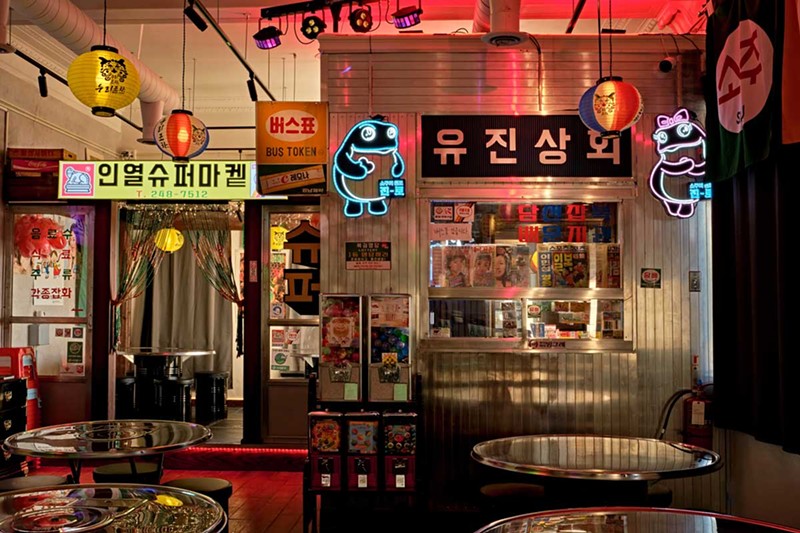It’s a sign the patrons really, really like the restaurant when management feels moved to post a sign limiting their stay to two-and-a-half hours. In an interview, Noori Pocha co-owner Andy Kwon explained that he and sister Nali wanted to recreate a true Korean experience, from the music to the details of the design. “Small spaces between tables, uncomfortable chairs, loud music, people talking loudly to the point where nothing can be heard is a typical Korean drinking atmosphere,” Kwon said. “People bumping into each other yelling to play games while drinking do not discomfort Koreans. They find it natural to drink in this atmosphere. It may not be for everyone, but once people break out of the ice, everyone starts to have a party.”
One weeknight I wondered if every Korean or Korean-American young person in the metro area had decided to eat and drink at Noori Pocha, crowded shoulder to shoulder on stools, eight to a round table. Another night I came at opening time, 5 p.m., and the atmosphere was chiller — especially since I snagged a seat in the streetside alcove, calm and slightly removed.
Open since August, Noori Pocha is a small space, dominated by a big TV screen showing Korean street scenes. Next door is Kwon’s original take-out place, Noori Chicken, opened during the pandemic, which also has a couple of tables to eat in. There’s a disco ball and some pulsing lights, but it’s not as frenetic as that might make it sound. It’s just the packed people in a small area that makes it loud, not unruliness.
Although the Kwons want to make it feel like Korea, they provide chopsticks with printed instructions on how to use them.
Your meal starts with a free appetizer, tteokbokki, which I would skip. The rubbery cylindrical rice cakes are tasteless (“does not have much taste on its own,” admits one recipe writer) and the spicy sauce is just a vinegary combination of unpleasant and hot.
It gets much better after that. The dishes are quite varied, ranging from mild and sweetish to more fiery; servers offer three spice levels. For iconic staple comfort food, you might want to order some sticky, spicy kimchi fried rice, bright red, which comes with the most beautiful fried egg I’ve seen: tall with a crusty bottom. The sourness of the kimchi is offset by the warm vibes of the fat.
Courtesy photo” class=”uk-display-block uk-position-relative uk-visible-toggle”>

Courtesy photo
Open since August, Noori Pocha is a small space, dominated by a big TV screen showing Korean street scenes.
“Spicy chicken with cheese” is just what it sounds like, redolent of the fermented condiment gojuchang, and the cheese being strands of mozzarella. It comes with four white rice balls studded with seaweed. So does “spicy pork,” again with gochujang prominent, the pork well-crisped.
Bulgogi is quite different: a beef dish that’s nearly sweet because of the heaps of onions. It’s sprinkled with green onions and still-crisp shredded carrots. This was the dish I most looked forward to reheating — portions are large and meant to be shared.
Another non-intense dish is shrimp pajeon, which is a big, thick pancake, crisp on top, with plenty of scallions and shrimp inside — really quite bland and yet inviting. It comes with a sweet-and-sour sauce filled with chives.
One night we were given a bunch of romaine, to make our own wraps.
I was disappointed not to find bibimbap on the menu but there’s a simple explanation. “It doesn’t go with drinking,” Kwon said.
Don’t leave Noori without trying the wings. This part of the store, the original, came about when the Kwons tried the chicken at a Virginia restaurant and thought it tasted just like what people were scarfing in Korea. Now the downtown Clawson location is one of a seven-store franchise, with four in Michigan. The wings come in orders of 8, 16, or 24, bone-in or deboned, and they have a perfect crust and a tender, moist interior. You get your choice of seven sauces. I was happy with soy-garlic and with “magic sprinkles,” the latter once a fad in Korea under the name “snow chicken.” It’s a cheese powder which is somehow sweet and it works surprisingly well with the fried fattiness of the bird. Other toppings are varying levels of chili sauce.
Noori Pocha offers four Korean beers and six more from Japan, Thailand, and China (and Bud Light, for the impoverished). The liquor of choice is the Korean national drink, soju, which can be made from rice, wheat, or barley. I ordered a 375 ml bottle of grapefruit soju and found it soft and smooth, very easy to drink. It’s only 13% alcohol.
Or better yet, mix soju and beer, as they do in the motherland. You can get a three-liter tower of Sapporo and Chum-Churum, a soju that touts being made with alkaline water, in a dispenser. That’s where the two-and-a-half hours comes in.
Location Details

Subscribe to Metro Times newsletters.
Follow us: Google News | NewsBreak | Reddit | Instagram | Facebook | Twitter
